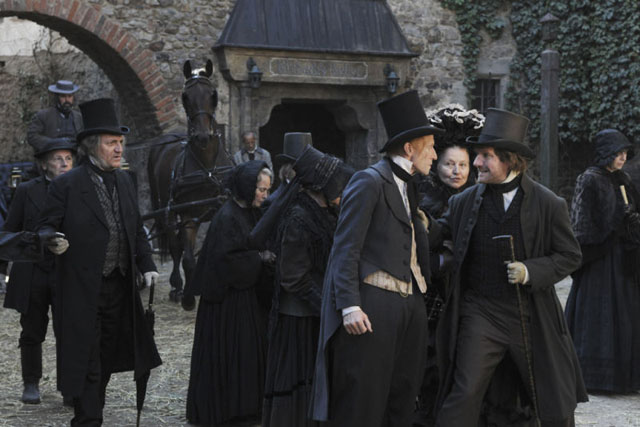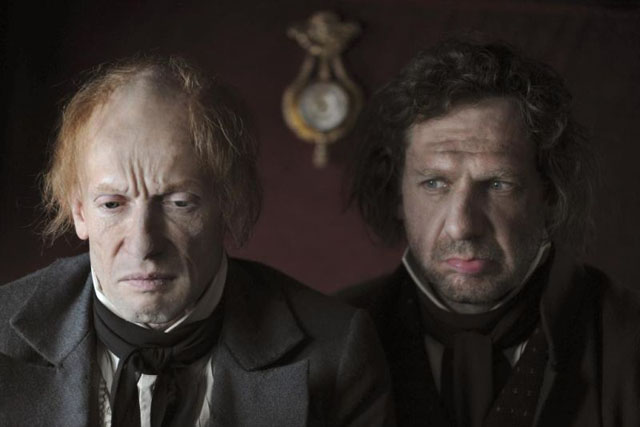“No wonder Aleksandr Sokurov‘s Faust—cranky, wild and visionary—won last year’s Venice Golden Lion,” begins Nigel Andrews in the Financial Times. “A Russian director filming in German transposes the story to Goethe’s time—though the archaic town on a promontory, first seen in a giddying aerial shot, looks deceptively medieval—and, concentrating on Faust Part 1, presents the doctor protagonist as an antic authorial alter ego, seeking fame and lucre through destructive self-assertion. That way the director of Moloch, Taurus and The Sun, Sokurov’s sombre inquisitional portraits of Hitler, Lenin and Hirohito, can call Faust the fourth part of a ‘tetralogy on the nature of power’ (his words) and present its Goethe-inspired hero, in part at least, as a real historical figure…. It’s a rude, lewd take on a classic, and irresistible.”
Neil Young for the Tribune: “Sokurov’s protagonist, Heinrich Faust (Johannes Zeiler) is an early-19th-century middle-European anatomist who believes that the human soul can be located within the body, messily dissecting corpses to justify his theories. His intellectual arrogance is challenged by Mauricius (Anton Adasinsky), the town’s wheedling moneylender, who dismisses Faust’s preoccupations with an airy ‘The soul? One can do without it. Why complicate things?’… Mauricius, whose imperious wife (Euro art-film legend Hanna Schygulla) waltzes around in an array of operatically excessive costumes – is never named as ‘Mephistopheles’ here, but he obviously fills the role of Goethe/Marlowe’s Satanic tempter. His bargain involves granting Faust carnal access to virginal damsel Gretchen (Isolda Dychauk), a character often named ‘Marguerite’ in previous iterations. Arguably Sokurov’s trump card, saturnine Dychauk is such a luminous screen presence that one might imagine a mature, intelligent scientist like Faust trading his eternal soul for a night in her bed.”
For Ryan Gilbey, writing in the New Statesman, the “key to the film’s potency lies in its acceptance of the magical and the repellent. When a hard-boiled egg is produced from between a woman’s legs during a gynaecological exam, no one bats an eyelid. (Nonplussed, she eats it.) A sword plunged into a stone wall releases an arterial spray of red wine. Faust’s telescope shows a monkey scampering around on the surface of the moon and an admirer presents Margarete with a gently whimpering homunculus in a jar. Sokurov extends no special fanfare or emphasis to these fantastical sights, knitting them routinely into the film’s fabric…. The skill of Sokurov’s version is that it takes this parable of moral decay and makes it feel as fresh and haunting as a nightmare.”
Tony Ryans for Sight & Sound: “The most immediately striking thing about this Faust is that Sokurov has junked the dynamic which powers most versions of the story: the bantering debate between Faust and the Devil. Goethe was happy to recognise these characters and their philosophical duelling as aspects of himself (he said so to Johann Peter Eckermann, as recorded in Conversations with Goethe), and virtually all other artists and commentators have similarly seen the clash between an ascetic melancholy and a worldly cynicism as the core of the story. Sokurov rethinks Faust as a driven and somewhat sadistic materialist, beset with money worries, and Mephistopheles as the apparent answer to his problems: a moneylender…. The thought inevitably strikes that Sokurov might see himself as a Faust – until we reflect that Sokurov has less trouble with finance than almost any of his contemporaries, and certainly much less than his revered Tarkovsky once had. Faust was underwritten with $11 million in subsidies from the Mass Media Development and Support Foundation and the Russian Cinema Fund—and there are photos of Sokurov receiving the cash from his friend Vladimir Putin to prove it. It’s a scary thing, the will to power.”
More from Peter Bradshaw (Guardian, 3/5), Dave Calhoun (Time Out London, 3/5) and David Jenkins (Little White Lies).
For news and tips throughout the day every day, follow @KeyframeDaily on Twitter and/or the RSS feed.





